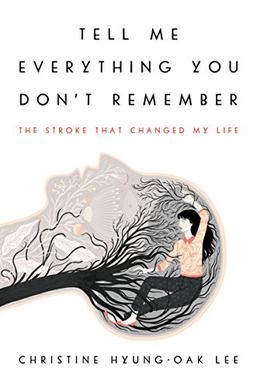Tell Me Everything You Don't Remember
Tell Me Everything You Don't Remember: The Stroke That Changed My Life is a memoir by author Christine Hyung-Oak Lee, which details her experience with a stroke at the age of 33 and her subsequent journey towards recovery. Published in 2017, the book explores themes of memory, identity, resilience, and the impact of sudden illness on one's life and sense of self. Through her narrative, Lee provides insight into the challenges and revelations encountered on the path to rehabilitation and how the stroke served as a catalyst for profound personal transformation.
Synopsis[edit | edit source]
The memoir begins with Lee waking up with a strange sensation in her arm, which she initially dismisses as a pinched nerve from sleeping awkwardly. However, as her symptoms escalate, it becomes clear that she is experiencing a stroke. The book delves into the immediate aftermath of this realization, the emergency measures taken, and the initial stages of recovery. Lee candidly shares the fears, frustrations, and moments of despair she faces, as well as the milestones and victories, however small, that mark her journey towards regaining her independence and redefining her identity.
Themes[edit | edit source]
Tell Me Everything You Don't Remember touches on several key themes, including:
- Memory and Identity: Lee's stroke significantly affects her memory, challenging her understanding of who she is. The memoir explores the relationship between memory and identity, questioning how much of our sense of self is tied to our memories.
- Resilience and Recovery: The narrative is a testament to human resilience, showcasing the author's determination to recover and adapt to new limitations and possibilities.
- The Impact of Illness: Lee's account provides a personal perspective on how sudden illness can alter every aspect of one's life, from daily routines to deeper existential considerations.
Reception[edit | edit source]
The book has been praised for its honesty, eloquence, and the author's ability to convey the profound and often overlooked challenges of recovering from a stroke. Critics and readers alike have noted Lee's skillful storytelling and her capacity to draw readers into her personal experience, making Tell Me Everything You Don't Remember not only a memoir but also an important contribution to literature on illness and recovery.
See Also[edit | edit source]
Search WikiMD
Ad.Tired of being Overweight? Try W8MD's physician weight loss program.
Semaglutide (Ozempic / Wegovy and Tirzepatide (Mounjaro / Zepbound) available.
Advertise on WikiMD
|
WikiMD's Wellness Encyclopedia |
| Let Food Be Thy Medicine Medicine Thy Food - Hippocrates |
Translate this page: - East Asian
中文,
日本,
한국어,
South Asian
हिन्दी,
தமிழ்,
తెలుగు,
Urdu,
ಕನ್ನಡ,
Southeast Asian
Indonesian,
Vietnamese,
Thai,
မြန်မာဘာသာ,
বাংলা
European
español,
Deutsch,
français,
Greek,
português do Brasil,
polski,
română,
русский,
Nederlands,
norsk,
svenska,
suomi,
Italian
Middle Eastern & African
عربى,
Turkish,
Persian,
Hebrew,
Afrikaans,
isiZulu,
Kiswahili,
Other
Bulgarian,
Hungarian,
Czech,
Swedish,
മലയാളം,
मराठी,
ਪੰਜਾਬੀ,
ગુજરાતી,
Portuguese,
Ukrainian
Medical Disclaimer: WikiMD is not a substitute for professional medical advice. The information on WikiMD is provided as an information resource only, may be incorrect, outdated or misleading, and is not to be used or relied on for any diagnostic or treatment purposes. Please consult your health care provider before making any healthcare decisions or for guidance about a specific medical condition. WikiMD expressly disclaims responsibility, and shall have no liability, for any damages, loss, injury, or liability whatsoever suffered as a result of your reliance on the information contained in this site. By visiting this site you agree to the foregoing terms and conditions, which may from time to time be changed or supplemented by WikiMD. If you do not agree to the foregoing terms and conditions, you should not enter or use this site. See full disclaimer.
Credits:Most images are courtesy of Wikimedia commons, and templates Wikipedia, licensed under CC BY SA or similar.
Contributors: Prab R. Tumpati, MD

